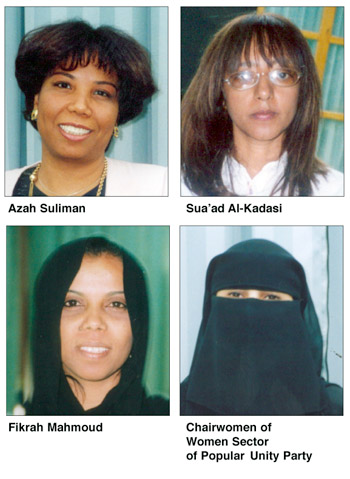
Yemeni Women Explore Their Rights Buried For Long [Archives:2001/34/Reportage]
August 20 2001

The Yemeni woman is not a different female character, for all are the same all over the globe. They may only wait for long in patience, but they never accept being belittled.
Hand in hand the Women’s Forum for Research & Training (WFRT) and OXFAM UK Sana’a laid the foundation, the initial step to make the females in Yemen fully comprehend their rights and their means of defending them.
At the Businesswomen Headquarter Location in Hada- Sana’a, the WFRT and OXFAM organized a training session attended by representatives of the international organizations concerned with eliminating discrimination and aggression against women.
Ms. Sua’ad Al-Kadasi, manager of WFRT, conveyed to Yemen Times that the aim of the 8-16 August training session is to broaden the social awareness on some concepts related to women’s rights in general. ” The Yemeni government does not reject or efface the social and political rights of women. The problem here is the tradition inherited by the society, generations after generations burying the rights of women,” Ms. Sua’ad believes. The WFRT, she added, is planning to organize more training sessions and activities that the majority of the society has fully comprehended that women’s rights and human rights are two sides of same coin.
Lawyer Azah Suliman, the manager of the Egyptian Women’s Affairs Center and a lecturer at the training session, has spoken about a couple of aims: Recognizing the women’s issues linked with the CEDAW agreement, which means in short ending all kinds of sex discrimination and aggression against women, as well as providing the participants with the required skills to be able to write the shadow report which corresponding the official report usually made by the government to be presented to the United Nations committee concerned on women rights.
” Mass media in Yemen is no different from its counterparts in other Arab states, a public institution owned by the government as property. In Yemen and other Arab states media is still lacking more training on the means of dealing with women’s issues. With high speed the media might defame a woman to discover later that the wretched was only a victim” Azah added.
Coordinator of the Amnesty International Organization (AIO), Noor Addin Al-Azazi said that although Yemen’s government never cooperates with the AIO except in what might serve its own interests, and while most of the negotiations between the two sides failed to reach agreement, it is the sole Arab government which approved the CEDAW treaty, except article No. 29 clause 1 concerning arbitration. The other Arab countries including the developing ones, made numerous reservations on the CEDAW articles. I am afraid this can only be found in the written law while the reality appears in a different cloak. Aspiration and reality are on parallel lines never to meet. “Our inherited social traditions are a challenge for the rights of women in the country,” Al-Azazi concluded.
Muna Al-Mashoor, a participant at the training session, travelled a long distance from Hadhramout to Sana’a to represent the female character in her governorate. She has embraced much of what she got from the session.
” The lectures, discussions and opinions echoed during the training session shocked me into finding myself, as if for the first time, to come to know the real social, political and humanitarian rights of women have been buried under the remains of inherited social traditions long ago. I have to know how to take note of my rights. What I have is much valuable than jewelry” Muna said. Regarding the women of Hadhramout’s positive participation in the society, Muna assured Yemen Times that the female characters in Hadhramout began joining the society and the education fields. They have started searching for their political and social rights.
——
[archive-e:34-v:2001-y:2001-d:2001-08-20-p:./2001/iss34/report.htm]


